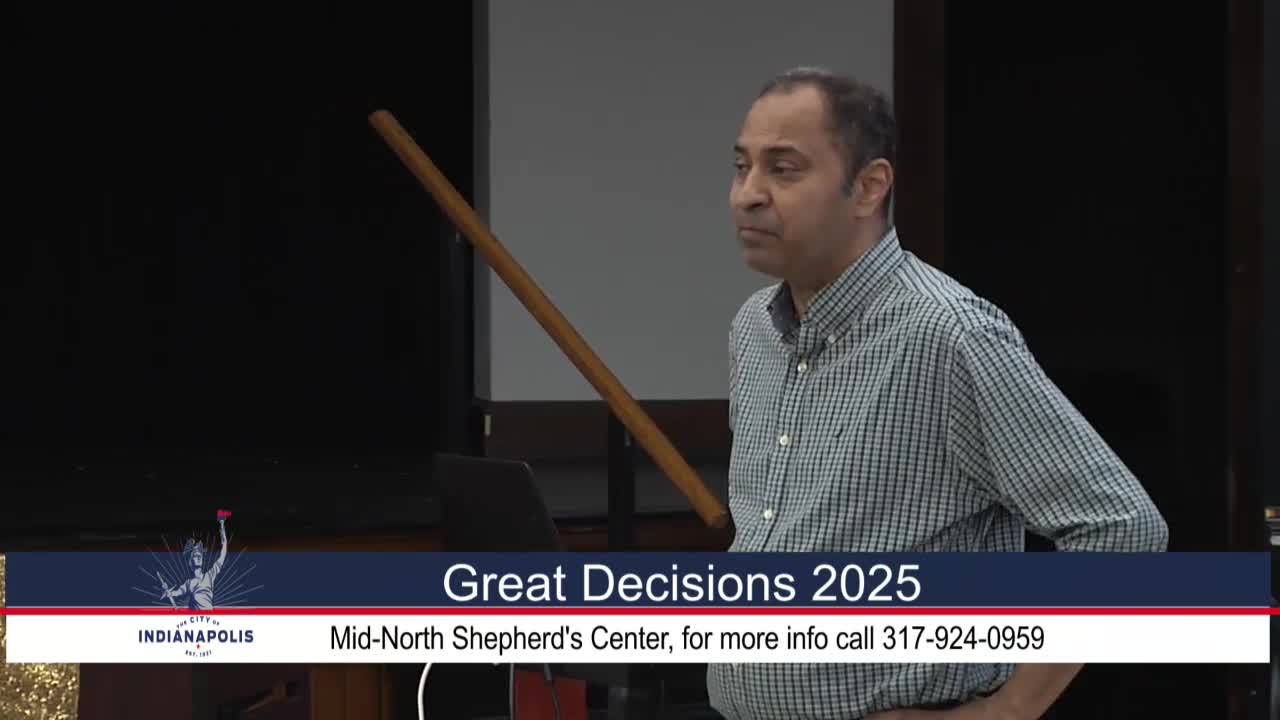India hedging between U.S., China and Russia as it adapts to a multipolar world, professor says
Get AI-powered insights, summaries, and transcripts
Subscribe
Summary
Dr. Milind Takar, a professor at the University of Indianapolis, told an on‑campus audience that India’s foreign policy has moved from Cold War nonalignment to pragmatic ‘hedging’ among the United States, China, Russia and the Global South, driven by security, trade and energy needs.
Dr. Milind Takar, professor and graduate director of the international relations program at the University of Indianapolis, said India is pursuing a pragmatic foreign policy that balances ties with the United States, China and Russia while maintaining links with the Global South.
Takar told the audience that India’s post‑independence nonalignment evolved after the Cold War into a more pragmatic approach, a position he described as “hedging” that aims to avoid permanently aligning with any single great power. He said that history — including a 1971 treaty of friendship with the Soviet Union, decades of Soviet defense cooperation and India’s decision not to join the Non‑Proliferation Treaty — shaped New Delhi’s long‑term caution toward binding alliances.
Why it matters: India’s choices affect trade, regional security and global supply chains. Takar said U.S. policy, sanctions tools such as the SWIFT financial messaging system and shifting U.S.‑China relations influence how far India leans toward Washington or seeks alternatives.
Takar cited recent examples of India’s pragmatic posture. He said India has purchased sanctioned Russian oil and re‑exported some of it on the open market and noted continued Russian defense ties alongside purchases from France and other suppliers. He described how the U.S. has courted India — including talk of a strategic partnership — while U.S. tariff actions and competition with China complicate deeper alignment.
Takar discussed the disputed India‑China border, citing Arunachal Pradesh as one contested area, and said repeated incidents of small‑scale clashes have kept New Delhi cautious about Beijing. He argued that China’s faster industrialization and poverty reduction have left India behind on key development metrics even as India expands its service economy and technological workforce.
On sanctions and financial tools, Takar warned that measures such as exclusion from SWIFT underscore a vulnerability for countries and prompt India and others to consider alternatives to dollar‑centric systems. He said these considerations, and variance in U.S. policy, will shape how decisively India moves toward or away from the United States in coming years.
"Neutrality is immoral," Takar recalled quoting U.S. Secretary of State John Foster Dulles to illustrate Cold War U.S. attitudes, adding that India’s modern posture reflects a desire to ‘‘make everybody happy’’ so it can pursue economic growth and security.
Takar concluded that India is likely to continue hedging among partners rather than forming a permanent alliance, and that U.S. policy over the next few years will be especially consequential for whether India tilts more toward Washington or maintains a multipolar strategy.
